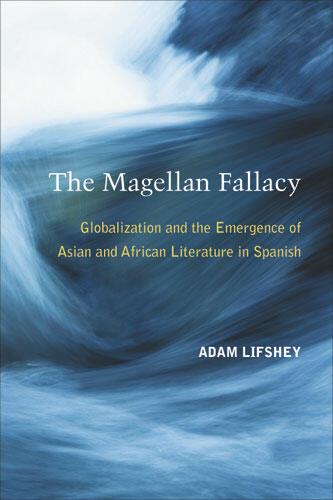The Magellan Fallacy
Globalization and the Emergence of Asian and African Literature in Spanish
Now available in paperback—the award-winning first study of Spanish-language literature of Southeast Asia and West Africa
Description
Winner of the 2015 A-Asia/ICAS Africa-Asia Book Prize, a global competition, for the best book in English, French, or Portuguese on any topic linking Asia and Africa.
The Magellan Fallacy argues that literature in Spanish from Asia and Africa, though virtually unknown, reimagines the supposed centers and peripheries of the modern world in fundamental ways. Through archival research and comparative readings, The Magellan Fallacy rethinks mainstream mappings of diverse cultures while advocating the creation of a new field of scholarship: global literature in Spanish. As the first attempt to analyze Asian and African literature in Spanish together, and doing so while ranging over all continents, The Magellan Fallacy crosses geopolitical and cultural borders without end. The implications of the book, therefore, extend far beyond the lands formerly ruled by the Spanish empire. The Magellan Fallacy shows that all theories of globalization, including those focused on the Americas and Europe, must be able to account for the varied significances of hispanophone Asia and Africa as well.
Adam Lifshey is Professor in the Department of Spanish and Portuguese and the Program in Comparative Literature at Georgetown University, as well as the author of As Green as Paradise: A Novel, and Subversions of the American Century.
Reviews
“The book’s aim is as ambitious as it is timely: that of establishing a new field of global Hispanic studies emphases, one that bypasses the hidebound departmental binary of Peninsular/Latin American, that encompasses significant achievements of Hispanic literature coming out of Asia and Africa. What the author has accomplished is nothing short of a paradigm shift that will produce repercussions throughout 21st-century Hispanic studies.”
—Eugenio Matibag, Iowa State University
"This volume serves as a valuable point of departure for the study of a largely unexplored subject: fiction written in Spanish in Equatorial Guinea and the Philippines during and following Spain's colonization . . . Recommended."
—P.W. Manning, Choice
"This is a work masterfully rendered, witty, original in its central thesis, and seminal in its scope. A classic in the making."
—Africa-Asia 2015 Book Prize Committee
"This volume serves as a valuable point of departure for the study of a largely unexplored subject: fiction written in Spanish in Equatorial Guinea and the Philippines during and following Spain's colonization. ... Recommended."
- P.W.Manning
—P.W. Manning, Choice

